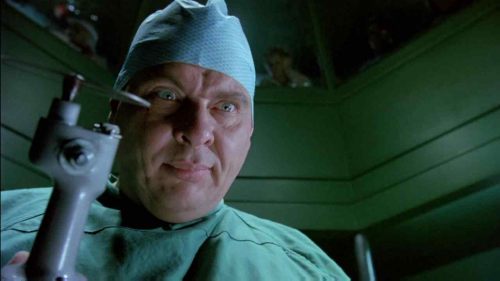Satire In The Suburbs: 25 Years With SERIAL MOM
Over the years, the true crime genre has become an increasingly popular fixation. There are endless television shows, docuseries, and documentaries that are “based off real events” committed by deranged individuals. Our society tends to have a flare for making celebrities out of dysfunctional individuals. Writer/director John Waters understands our society’s appeal to violence as well as the subsequent sociological absurdities humans display. His 1994 film Serial Mom takes a sharp, satirical look at our obsession with serial killers by introducing us to a maternal murderer who is both wholesome and hellish.
When you think of a serial killer, you usually don’t imagine a mother donning a floral dress and pearls, living a comfortable life in the suburbs, baking pies for her community, and cheerfully chirping at birds outside her window like a modern Snow White. John Waters plays society’s stereotypes to his advantage and creates a twisted character so impactful that many today still think Serial Mom is actually based off of a real person. Kathleen Turner stars as Beverly Sutphin, a housewife whose cookie-cutter family is every bit as conventional as one may imagine in a safe suburban neighborhood. Her husband Eugene (Sam Waterston) works as a dentist, and their two teenage children Chip (Matthew Lillard) and Misty (Ricki Lake) get along better than most siblings. They’re a functional family that loves and supports one another. Beverly is also the kind of mother reminiscent of June Cleaver. She greets her children’s teachers with home-cooked goods, keeps a tidy house, and encourages her children not to swear. She has no gang affiliation, religious motive, or delusions of grandeur. “The only ‘serial’ I know anything about is Rice Krispies”, Beverly tells her concerned family in a coy voice. What drives Beverly to murder are the seemingly small things in life or annoyances that many of us face every day. Not recycling, stealing someone’s parking spot, and wearing white after Labor Day are all instances that justify getting the knife (or scissors, fire iron, air conditioning unit, or leg of lamb). Waters lampoons the little things that make humans go crazy and our subsequent inflamed and dramatized reactions to crime news. It’s a perspicacious method to make Beverly relatable and allows for audiences to empathize with her character, whereas other films may feature a murderer who has minimal to no redeeming qualities - certainly none that viewers can admit they’re guilty of feeling or thinking.
Known for his transgressive cult films such as Pink Flamingos and Multiple Maniacs, Waters has a knack for satire and layering comedy into his work. In Serial Mom, he patches comedy together with loveable elements of the horror genre through film references and tropes. Chip is the manager of a video store (one that Waters frequented as a youth in real-life), and his film knowledge frequently coincides with the events that unfold as Beverly goes on her murder spree. References to Strait-Jacket, The Texas Chain Saw Massacre, A Nightmare on Elm Street, and Henry: Portrait of a Serial Killer are scattered throughout the film as well as throwbacks to Herschell Gordon Lewis, the “Godfather of Gore”. When the first murder occurs, Chip’s girlfriend excitingly calls him and exclaims, “Did you hear? This is so cool! It’s just like a horror movie!” The characters experience various degrees of exhilaration throughout the film, even when they realize their beloved mother or neighbor is actually the one on the hunt. Furthermore, even the characters who have had their family members killed by Beverly are quickly eased once the conversation turns to the press and who could play them in a movie. Waters utilizes these horror references as a reminder that a love for the genre does not make a murderer, despite the prevalent argument of the day from various overprotective parents. Furthermore, our intrigue for the genre is not that different from our fascination with true crime and how one affinity is more socially acceptable than the other. Everyone loves true crime and probably has a favorite killer, and yet the horror genre is still shunned or degraded.
The fascination and glamorization of serial killers grows as the film progresses. Beverly’s body count begins to add up as does her love of true crime and killers as well. It’s revealed that she has a binder of news clippings from various killers under her bed and recordings of conversations with Ted Bundy (voiced uncredited by John Waters himself). Detectives discover Beverly’s recent book purchases consist of Hunting Humans and Helter Skelter. All of her purchases seem perfectly normal given our society’s intrigue with the true crime genre. Mind you, these are the days before Court TV and the OJ Simpson trial, which occurred two years later. In a way, Serial Mom serves as apt foreshadowing to our continuing fascination with true crime entertainment.
Once Beverly is labeled “Serial Mom” and goes to trial, she becomes quite the local celebrity. The bouncer at a local punk bar lets her skip the lines and enter the club where L7 is playing on stage. In similar fashion to people selling t-shirts outside of the Waco siege when David Koresh and his Branch Davidians had their stand-off with police in 1993, Misty sells her homemade t-shirts, banners, and buttons outside of the courthouse during Beverly’s trail, proudly claiming “Serial Mom” as her mom. The fascination doesn’t stop at just the local level either. Movie star Suzanne Somers visits the courtroom and hopes to play “Serial Mom” in the future. Beverly is now “bigger than Freddy or Jason”, and when she asks her son if he thinks she needs a lawyer, he replies, “No, you need an agent!” During the trial, the family’s life ironically improves. Misty starts dating a reporter; Chip becomes an agent; and Eugene’s perspective on killers changes, but his love for his wife does not dwindle.
Throughout the film, various scenes question our societal and religious construct around murderers. In the beginning of the film, the family discusses a killer who recently received his GED while in prison. While most of the family believes in capital punishment, Beverly does not, and instead softly states “everyone has their bad days” and “that’s nice” he received his education while incarcerated. Even their church congregation discusses capital punishment when Father Bryce states, “Capital punishment is already the law in the state of Maryland. So what are we waiting for, fellow Christians? Let’s just do it!” Additionally, there is a scene where Beverly’s neighbors are watching Serial Hags, a television show hosted by Joan Rivers and devoted to women who love serial killers. The host asks her guest how she can love a mass murderer and she replies, “It’s easy. He’s handsome, he’s famous, and we get conjugal visits.” And sometimes, that’s all it takes. This is evident with the abundant number of women who write letters to killers while they’re behind bars. Waters himself taught in local prisons and does not believe in capital punishment, opting for belief in reform. He has openly stated in interviews that he is friends with murderers who have gone on to mend their lives and have been functioning citizens while contributing to society. In this regard, Waters utilizes Serial Mom as a satire on political correctness, but also the ability for people’s perspectives on murderers to mold and change given the context. This is especially evident with Eugene’s character as he was strongly opposed to reform in the beginning of the film; but once his wife became a murderer, his perspective changed.
Serial Mom is a witty glorification of violence for comedy. Waters’ films are about people who are outside of the norm and who take what society uses against them, twist it into a specific style, and eventually come out winning. Beverly is a comical depiction of what many of us feel every day, whether that be annoyance towards neighbors or past-time passions consisting of horror movies and true crime. Waters deviates from the common killer stereotype and instead of analyzing what trauma led to Beverly’s decisions, reflects on our society and what attracts us to deviant behavior. Our fascination with serial killers has always been there even more so after the release of Waters’ film. Today, I suggest taking a break from binge-watching The Ted Bundy Tapes in preparation for the release of Extremely Wicked, Shockingly Evil and Vile or brushing up on Charles Manson for Once Upon a Time in Hollywood, and instead revisiting Beverly Sutphin’s story - I just hope you recycle.



